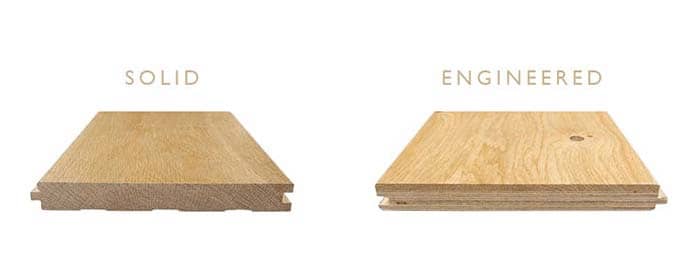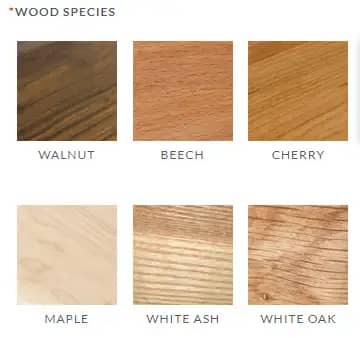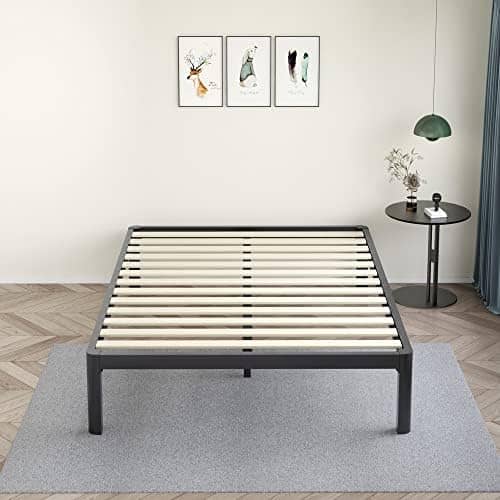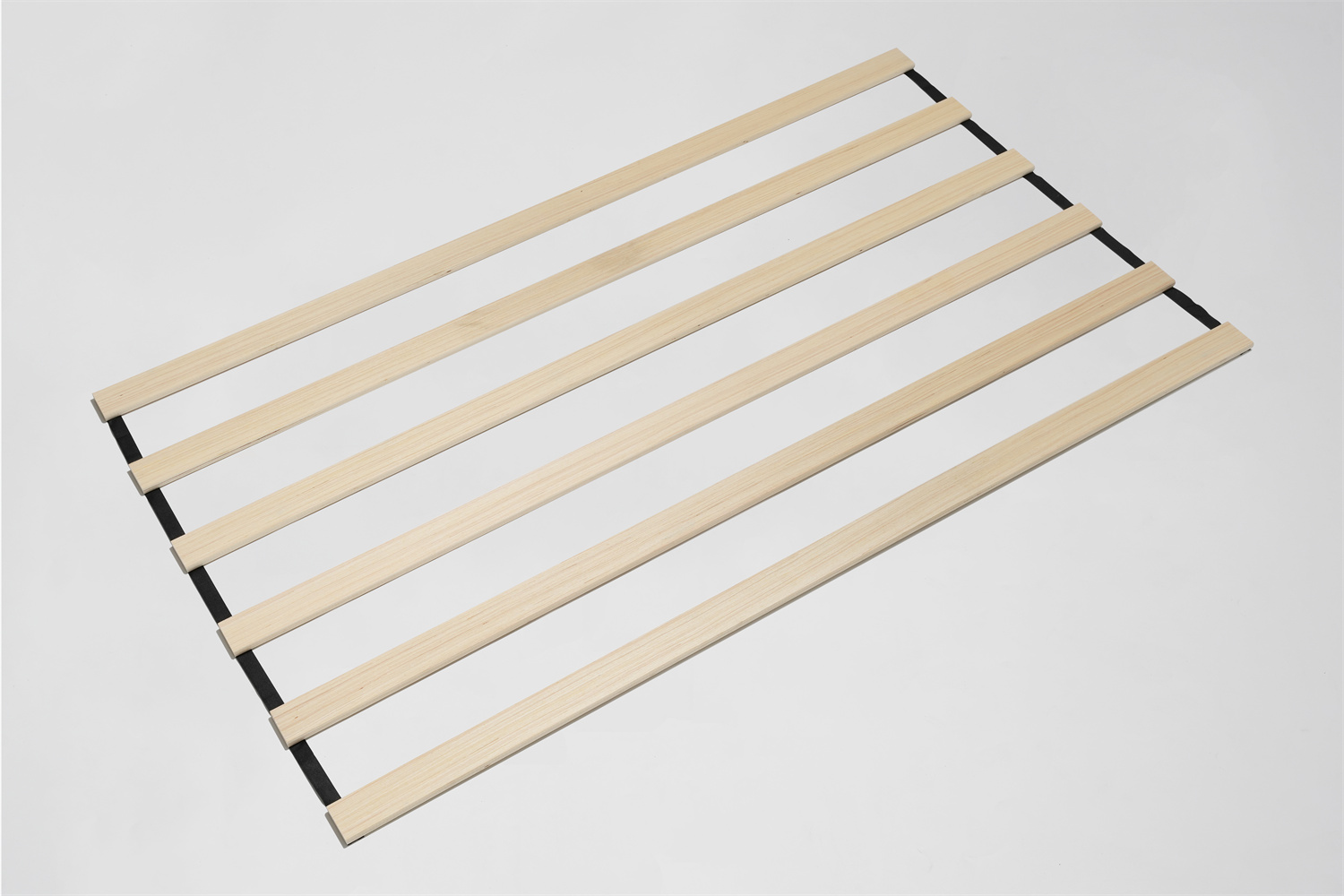A escolha das ripas de cama corretas é crucial para uma boa noite de sono, e o debate entre madeira maciça e as opções de engenharia como o contraplacado ou LVL (Laminated Veneer Lumber) deixam frequentemente os compradores indecisos. Ambos os materiais oferecem vantagens únicas, e compreender as suas diferenças é fundamental para tomar uma decisão informada que se alinhe com o seu orçamento, preferências de design e nível de durabilidade desejado. Procura o apelo clássico da madeira natural ou o desempenho consistente de um produto manufaturado? Vamos mergulhar e explorar os prós e os contras de cada opção.

Aprofundar os pormenores
O que são ripas de madeira maciça?
Como o nome sugere, as ripas de madeira maciça são fabricadas a partir de uma única peça de madeira, mostrando a beleza natural e os padrões de grão únicos da madeira. São uma escolha popular pela sua estética clássica, proporcionando um atrativo intemporal que muitos consideram desejável, e são frequentemente associadas a uma maior qualidade e habilidade. Desde o encanto rústico do pinho nodoso até à elegância da nogueira, as ripas de madeira maciça oferecem uma gama de opções estéticas para complementar qualquer decoração de quarto.
O que são ripas de cama de engenharia?
As ripas de cama artificiais, incluindo contraplacado e LVL, são fabricadas através da colagem de várias camadas de lâminas de madeira finas com adesivos sob calor e pressão. Esta técnica de camadas de grão cruzado aumenta a força, a estabilidade e a resistência à deformação, tornando-as uma alternativa durável e fiável à madeira maciça, especialmente em aplicações onde a humidade ou cargas pesadas são uma preocupação. Não se deixe enganar pelo termo "projetado"; estas ripas continuam a utilizar madeira verdadeira, mas de uma forma mais inteligente e eficiente.
Como funcionam as ripas da cama:
Independentemente do material, as ripas da cama funcionam como uma base de apoio para o seu colchão, distribuindo o peso uniformemente e promovendo o fluxo de ar para evitar a acumulação de humidade, que pode provocar bolor, mofo e odores desagradáveis. Normalmente, são colocados ao longo da estrutura da cama, apoiados em vigas ou calhas de suporte, e funcionam em conjunto com a estrutura da cama para proporcionar uma superfície de dormir estável e confortável. Pense neles como os heróis anónimos de uma boa noite de sono, trabalhando incansavelmente nos bastidores para manter o seu colchão apoiado e o seu corpo devidamente alinhado.
Confronto de ripas: Uma comparação lado a lado
| Caraterística | Ripas de madeira maciça | Lâminas de contraplacado | Lâminas LVL |
|---|---|---|---|
| Material | Uma única peça de madeira, com padrões de grão naturais e variações de cor. Cada ripa é única, como uma impressão digital. | Múltiplas camadas de lâminas de madeira finas coladas entre si, resultando num aspeto mais uniforme. Este processo garante consistência e previsibilidade. | Múltiplas camadas de lâminas de madeira finas coladas entre si com grãos especificamente orientados para a máxima resistência e estabilidade. Esta engenharia direcionada maximiza o desempenho. |
| Força | Bom, mas varia significativamente consoante a espécie de madeira. As madeiras duras como o carvalho e o ácer são mais fortes do que as madeiras macias como o pinheiro e o abeto. A escolha da madeira correta para o trabalho é crucial. | Boa resistência geral, oferecendo um equilíbrio entre acessibilidade e durabilidade. Isto torna-os adequados para a maioria das estruturas de cama e colchões normais. | Excelente relação resistência/peso, o que os torna ideais para aplicações pesadas. Podem suportar até as travessas mais entusiastas. |
| Durabilidade | Bom, mas pode ser propenso a empenar ou rachar com o tempo, especialmente com flutuações de humidade e temperatura. A manutenção e os cuidados adequados podem atenuar estes riscos. | Boa durabilidade e resistência à deformação, o que as torna uma opção fiável para a maioria das estruturas de cama. Oferecem tranquilidade para quem não quer preocupar-se com as ripas da cama. | Excelente durabilidade e resistência à deformação, mesmo em ambientes húmidos ou sob cargas pesadas. Estas lâminas são feitas para durar, mesmo em condições exigentes. |
| Resistência à humidade | Justo; a madeira maciça é suscetível de absorção de humidade, o que pode provocar deformações, fissuras ou expansão. Evite colocar camas de madeira maciça em ambientes húmidos. | Boa resistência à humidade devido à estratificação cruzada, o que os torna adequados para ambientes mais húmidos. Oferecem um grau de desempenho sem preocupações em climas difíceis. | Excelente resistência à humidade, o que as torna ideais para áreas com elevada humidade ou níveis de humidade flutuantes. Se vive numa floresta tropical, estas são as ripas ideais para si. |
| Custo | Moderado a elevado, consoante a espécie e a qualidade da madeira. As madeiras nobres, como a cerejeira ou o mogno, são mais caras. No mundo da madeira maciça, o preço é o que se paga. | Baixo a moderado, o que os torna uma opção económica para uma vasta gama de estruturas de cama. Oferecem um excelente valor para quem tem um orçamento limitado. | Custo moderado, oferecendo um equilíbrio entre desempenho e acessibilidade. Está a investir na durabilidade a longo prazo e na paz de espírito. |
| Estética | Grão de madeira clássico e natural com variações únicas de cor e padrão, acrescentando calor e carácter a um quarto. Não existem duas ripas exatamente iguais, o que aumenta o seu encanto. | Aspeto uniforme com um padrão de grão consistente, oferecendo um aspeto limpo e moderno. Esta consistência pode ser apelativa em designs minimalistas ou contemporâneos. | Aspeto uniforme semelhante ao contraplacado, muitas vezes preferido pela sua funcionalidade à estética. Se procura um suporte discreto, estas ripas são a solução. |
Quadro 1: Um olhar comparativo sobre os materiais das ripas de cama
Aplicações: Onde cada tipo de ripa brilha
Ripas de madeira maciça:
- Mobiliário topo de gama: As ripas de madeira maciça, especialmente as fabricadas a partir de madeiras nobres como o carvalho ou a nogueira, são frequentemente preferidas pela sua estética luxuosa e apelo natural em camas topo de gama, acrescentando um toque de sofisticação e elegância. Imagine-se a afundar-se numa cama feita de mogno; é uma experiência por si só.
- Desenhos rústicos ou tradicionais: Os padrões e variações naturais do grão da madeira maciça complementam as estruturas de cama rústicas ou de estilo tradicional, melhorando a estética geral e criando uma atmosfera calorosa e convidativa. Pense em vibrações de cabana acolhedoras ou numa estética de quinta encantadora.
- Indivíduos que procuram uma opção natural e sustentável: As ripas de madeira maciça apelam aos consumidores que dão prioridade aos materiais naturais e às práticas sustentáveis, uma vez que são fabricadas a partir de um recurso renovável e podem ser retocadas e reutilizadas durante décadas. Estão em sintonia com um desejo crescente de uma vida eco-consciente.
Ripas de cama de engenharia:
- Beliches e camas em sotão: A resistência e a durabilidade superiores das ripas LVL tornam-nas ideais para beliches e camas altas, onde podem suportar cargas mais pesadas e uma utilização ativa sem comprometer a segurança ou o apoio. Isto torna-as uma escolha popular para famílias com crianças ou indivíduos que procuram soluções para dormir que poupem espaço. Oferecem paz de espírito aos pais que pretendem a opção mais robusta para os seus filhos.
- Camas de plataforma: As ripas de contraplacado são uma opção económica e fiável para camas de estrado, proporcionando um suporte adequado para a maioria dos tipos de colchão sem necessidade de um estrado de molas. Oferecem um bom equilíbrio entre acessibilidade e desempenho, o que as torna adequadas para uma vasta gama de orçamentos. São uma escolha prática e popular para quartos modernos.
- Camas ajustáveis: O desempenho consistente e a resistência à deformação das ripas artificiais, especialmente LVL, tornam-nas adequadas para estrados ajustáveis, que são sujeitos a movimentos e tensões frequentes. Suportam os ajustes constantes e as mudanças de peso sem descaírem ou perderem a sua forma, garantindo um apoio e conforto a longo prazo. Proporcionam uma base estável para quem gosta de personalizar a sua posição de dormir.
- Ambientes com elevado teor de humidade: As ripas artificiais, com a sua resistência superior à humidade, são ideais para climas húmidos ou divisões propensas à humidade, como caves ou casas costeiras. É menos provável que se deformem, rachem ou desenvolvam bolor e mofo em comparação com as ripas de madeira maciça. Oferecem uma solução sem preocupações para ambientes difíceis.
Confronto de fornecedores: Yuantuo Wood vs. a concorrência
| Fornecedor | Localização | Gama de preços (por peça) | Especialidades |
|---|---|---|---|
| Madeira Yuantuo | China | $4 – $8 | Vasta gama de espécies de madeira, tamanhos personalizados, ênfase na sustentabilidade e práticas ecológicas. A empresa destina-se a quem procura materiais de origem ética. |
| John Lewis e Parceiros | REINO UNIDO | £10 – £25 | Madeiras de alta qualidade, com ênfase no artesanato e no design, oferecem ripas de cama de primeira qualidade para clientes exigentes. A sua oferta destina-se a quem procura o melhor do melhor. |
| Armazém doméstico | EUA | $5 – $15 | Variedade de materiais e tamanhos, preços competitivos, satisfazendo uma vasta gama de orçamentos e necessidades. Oferecem um balcão único para soluções de ripas de cama. |
| Wayfair | EUA | $3 – $12 | Vasta seleção de ripas de cama, incluindo opções de madeira maciça e de engenharia, com ênfase na acessibilidade e na comodidade. Oferecem uma experiência de compra online cómoda. |
Quadro 2: Comparação entre fornecedores de ripas de cama
Ponderar os prós e os contras
| Caraterística | Ripas de madeira maciça | Ripas de cama de engenharia |
|---|---|---|
| Vantagens | * Beleza natural e padrões de grão únicos, acrescentando calor e carácter ao mobiliário. Cada peça conta uma história. * Valor percebido e estética clássica, muitas vezes associados a uma maior qualidade e habilidade artesanal. Evocam uma sensação de tradição e intemporalidade. * Resistentes e duradouros, especialmente quando se utilizam madeiras duras, oferecendo um desempenho a longo prazo. Podem resistir ao teste do tempo com os cuidados adequados. * Material renovável e sustentável quando proveniente de florestas geridas de forma responsável. Estão em sintonia com os valores da consciência ecológica. | * Maior resistência e estabilidade devido à estratificação cruzada, o que as torna adequadas para aplicações pesadas. São os cavalos de batalha do mundo das ripas de cama. * Resistência à deformação e à fissuração, mesmo em ambientes húmidos ou sob cargas pesadas. Oferecem tranquilidade e um desempenho consistente. * Resistentes à humidade e menos susceptíveis de serem afectadas por alterações de humidade, assegurando um desempenho a longo prazo. São uma escolha fiável para climas difíceis. * Opção económica, especialmente o contraplacado, tornando-os acessíveis a uma gama mais vasta de orçamentos. Oferecem uma excelente relação qualidade/preço para quem procura um preço acessível. |
| Desvantagens | * Podem ser propensos a empenar, rachar ou fender com o tempo, especialmente com flutuações de humidade e temperatura. Requerem um pouco mais de cuidados para manter a sua beleza. * Susceptíveis a danos causados pela humidade e podem necessitar de manutenção regular para evitar deformações ou fissuras. Tenha em atenção o seu ambiente. * Mais caras do que as opções de engenharia, especialmente quando se utilizam madeiras nobres. O luxo tem um preço. * Requerem mais manutenção, como lixar e retocar, para manter o seu aspeto e longevidade. São um investimento em beleza que requer manutenção. | * Não têm a beleza natural e os padrões de grão únicos da madeira maciça, o que pode ser uma desvantagem para quem procura uma estética natural. Podem não ser a estrela do espetáculo. * Podem não ser tão apelativos esteticamente para algumas pessoas, uma vez que têm frequentemente um aspeto mais uniforme e manufaturado. Dão prioridade à função em detrimento da elegância. * Podem ser mais pesadas do que as ripas de madeira maciça, especialmente as LVL, o que pode dificultar o seu manuseamento durante a montagem ou o transporte. Se necessário, peça ajuda a um amigo. |
Quadro 3: Equilíbrio da balança: Vantagens e desvantagens de cada tipo de lâmina
Para além do básico: Factos interessantes sobre as ripas da cama
- Importância histórica: As ripas de cama têm sido um elemento básico na conceção de camas durante séculos, sendo as primeiras versões frequentemente feitas de cordas ou materiais entrelaçados, como couro ou fibras vegetais. A utilização de ripas de madeira tornou-se cada vez mais popular à medida que a madeira se tornou mais facilmente disponível e acessível. Há várias gerações que as ripas sustentam as pessoas que dormem cansadas.
- Vantagens ergonómicas: As ripas da cama corretamente espaçadas podem contribuir para uma melhor postura durante o sono e para o alinhamento da coluna vertebral, proporcionando um apoio consistente ao colchão, evitando a flacidez e promovendo uma distribuição adequada do peso. Isto pode ajudar a aliviar as dores de costas e a melhorar a qualidade do sono. Não se trata apenas de apoiar o seu colchão; estão a apoiar o seu bem-estar.
- Sustentabilidade: Escolher ripas de cama feitas de madeira colhida de forma sustentável, quer sejam sólidas ou artificiais, ajuda a proteger as florestas e a reduzir o impacto ambiental. Procure certificações como o Forest Stewardship Council (FSC) para garantir que a madeira é obtida de forma responsável. Pode dormir descansado sabendo que fez uma escolha com consciência ecológica.
Perguntas frequentes: Responder às suas questões sobre as ripas da cama
1. Qual é o espaçamento ideal entre as ripas da cama para evitar que o colchão descaia?
Para um apoio ótimo e uma maior longevidade do colchão, recomenda-se geralmente um espaçamento de 2-3 polegadas entre as ripas. No entanto, o espaçamento ideal pode variar consoante o tipo de colchão e o peso da pessoa que dorme. Em caso de dúvida, consulte as recomendações do fabricante do colchão.
2. Posso utilizar ripas de madeira maciça num estrado concebido para contraplacado?
Sim, as ripas de madeira maciça podem ser utilizadas em camas de estrado, mas certifique-se de que são compatíveis com o design da estrutura da cama e que proporcionam um suporte adequado para o seu colchão. Considere a espessura e o espaçamento das ripas para garantir uma distribuição adequada do peso e evitar a flacidez. Em caso de dúvida, opte por ripas mais grossas e mais espaçadas.
3. Como é que evito que as ripas da minha cama façam barulho sempre que me mexo?
As ripas que rangem são frequentemente causadas pela fricção entre as ripas e a estrutura da cama. Aplicar cera para móveis ou lubrificante nas extremidades das ripas ou nos pontos de contacto com a estrutura da cama pode ajudar a reduzir o ruído. Apertar quaisquer parafusos ou cavilhas soltas na estrutura da cama também pode minimizar o movimento e o ruído. Um pouco de manutenção ajuda muito a evitar os rangidos que perturbam o sono.
4. Qual é o tempo de vida típico das ripas de cama e como é que o posso prolongar?
A vida útil das ripas de cama varia consoante o material, a qualidade, a utilização e a manutenção. As ripas bem mantidas podem durar muitos anos, até mesmo décadas. Inspecionar e apertar regularmente quaisquer parafusos ou cavilhas soltas, limpar as ripas para remover pó e detritos e rodar o colchão periodicamente pode ajudar a prolongar a sua vida útil. Trate-as bem, e elas retribuirão o favor com anos de serviço fiel.
5. Posso cortar as ripas da cama à medida se não couberem na perfeição na minha estrutura de cama?
Sim, tanto as ripas de madeira maciça como as ripas de cama artificiais podem ser cortadas à medida utilizando ferramentas de carpintaria adequadas. No entanto, é crucial garantir medidas exactas e cortes limpos para manter a integridade estrutural. Se não se sentir à vontade para fazer os cortes por si próprio, considere consultar um profissional ou contactar o fornecedor das ripas para obter opções de dimensionamento personalizadas. A precisão é fundamental quando se altera o tamanho das ripas.
Ao considerar cuidadosamente os factores acima referidos, pode escolher com confiança as melhores ripas de cama para as suas necessidades, garantindo uma base confortável e de apoio para uma noite de sono descansada. Bons sonhos!




